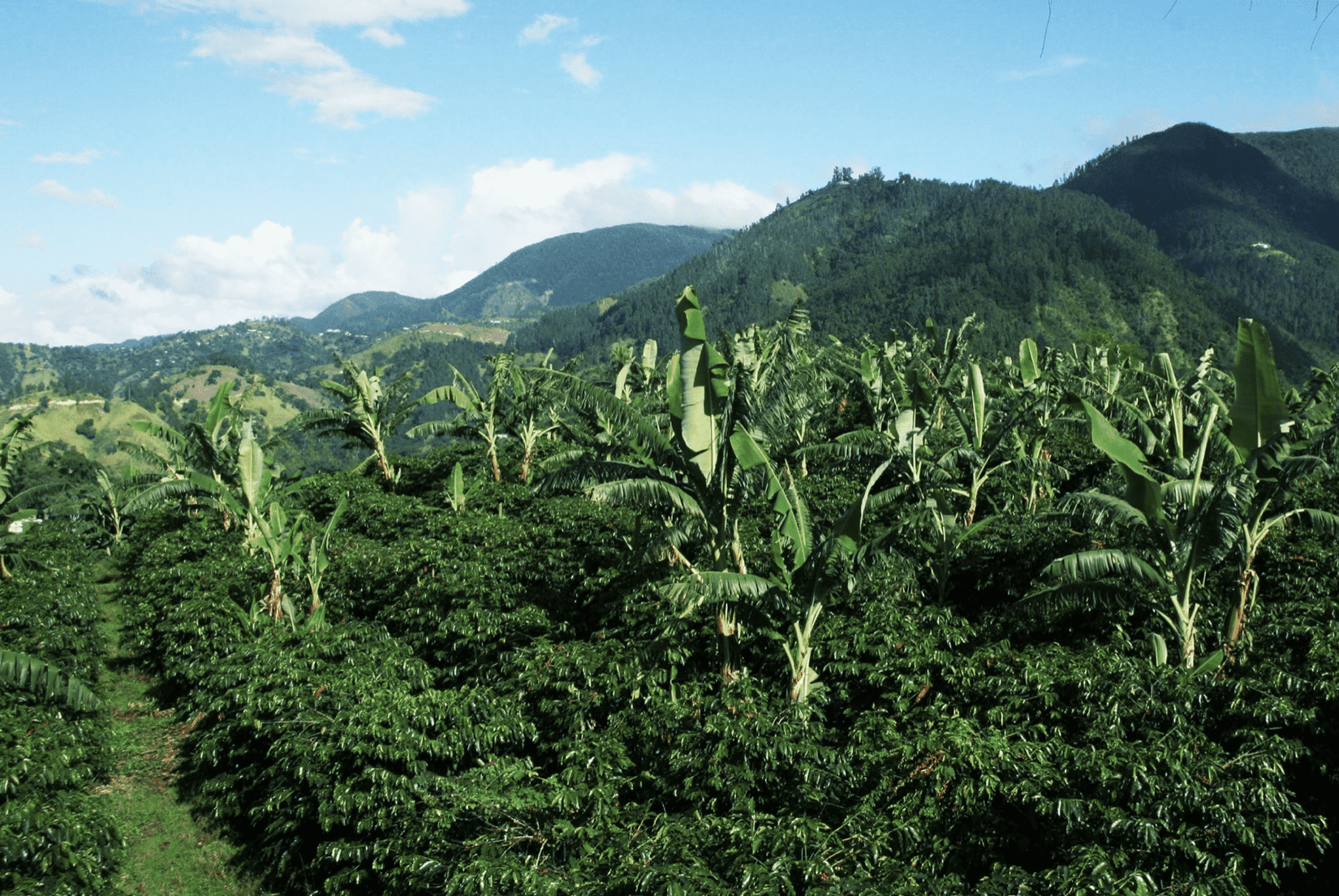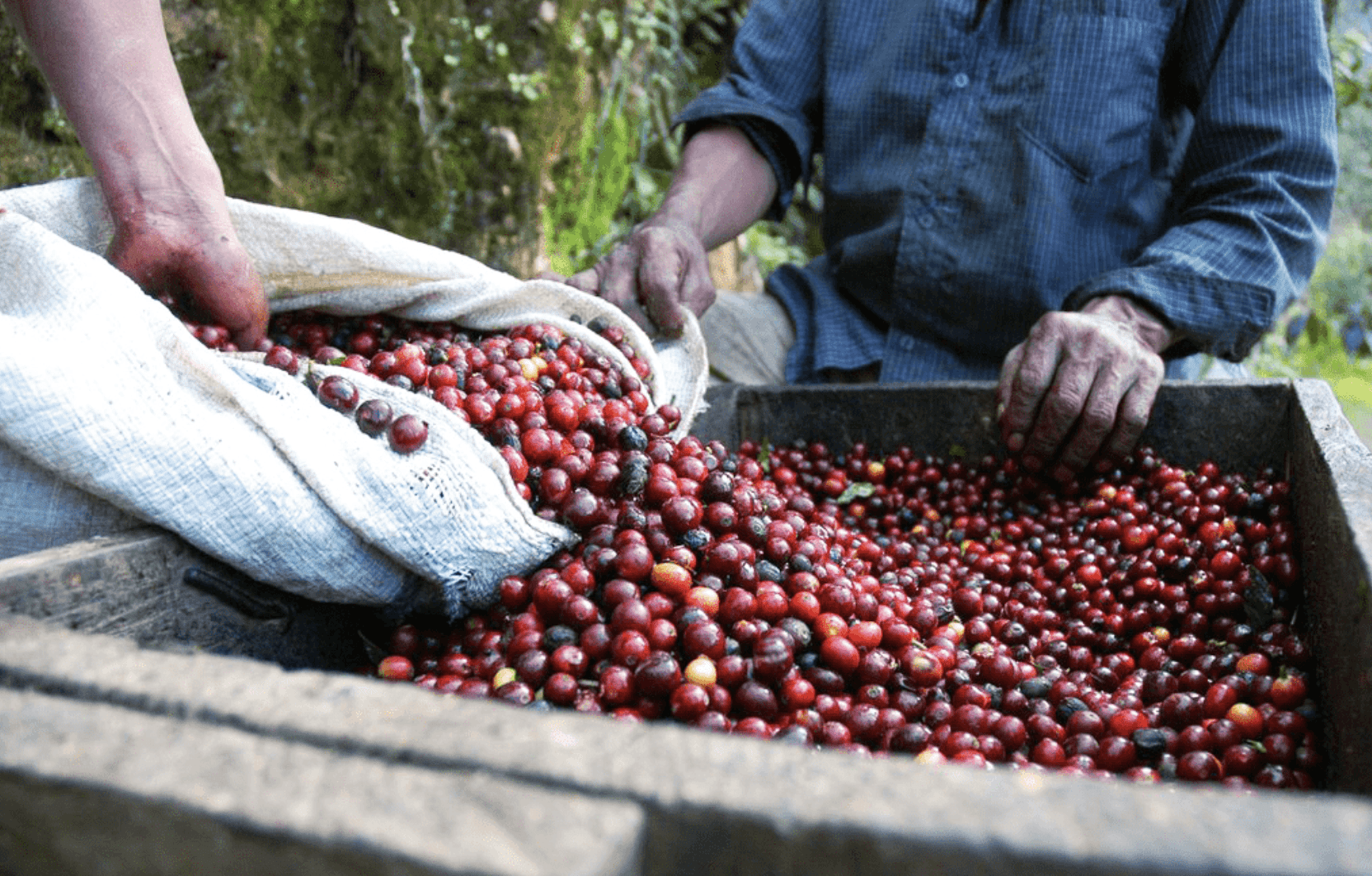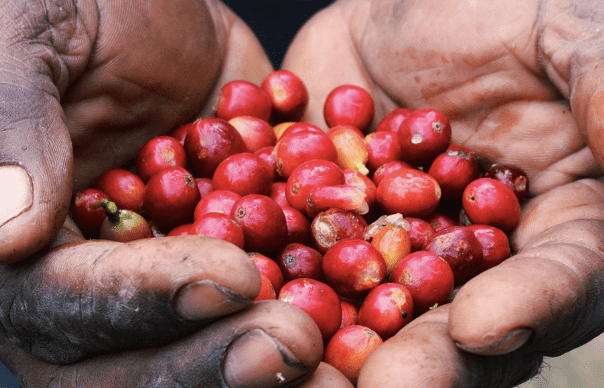Jamaican Blue Mountain coffee is the crown jewel of the specialty coffee market, and its beans are prized around the world as the highest quality luxury coffee consumers can buy.
Grown in the exclusive region of the island’s eastern mountains, Jamaican Blue Mountain coffee earns the highest unit value for its export than any other Arabica coffee bean. While Jamaica produces less than 0.1% of the world’s coffee, Jamaican Blue Mountain beans command an average unit price of roughly $22-$35 dollars per kilogram, where the average global export price for Arabica coffee hovers around $4 for the same amount.
At market, Jamaican Blue Mountain coffee consistently retails around $80 to $100 dollars per pound, retaining an indestructible reputation as the most sought after coffee in the world.
So, why is Jamaican Blue Mountain coffee so valuable?
In addition to being incredibly scarce, Blue Mountain coffee is renowned for its characteristically sophisticated flavor. A wet processed (or washed) coffee, Blue Mountain beans yield a coffee that is silky and well-balanced, with a full body and classic, refined taste. Blue Mountain beans are known for their unusually sweet flavor and richness, yielding a coffee that is cream-like. The taste is complex—often with hints of chocolate, a bright acidity and almost no bitterness.
At its best, Jamaican Blue Mountain coffee produces a quintessential cup and one of the world’s most premium and luxury brews.
Where is Blue Mountain coffee grown?
Certified Blue Mountain coffee can only be produced in an exclusive region of the island’s Blue Mountains, which form a crown around the island’s eastern side.
Blue Mountain coffee is produced on roughly 14,000 acres of land and, more specifically, can only be grown between elevations of 3,000 and 5,500 feet in the island parishes of Saint Thomas, Saint Andrew, Saint Mary and Portland. Lesser renowned coffee is grown below these elevations, like Jamaica High Mountain and Supreme varieties.
This is an area of Jamaica with distinctive environmental conditions which slow the ripening of the berries and produce Jamaican Blue Mountain coffee’s distinctive flavor.

Cool and misty with high rainfall, the Blue Mountain region possesses nutrient-rich soil and an ideal climate for coffee production. In the afternoons, a mist envelopes the slopes of the Blue Mountains and moderates the temperature and humidity, slowing the ripening process. Over two rainy seasons, the beans in the Blue Mountains mature at a slower rate than anywhere else, and they develop a depth of acidity, aroma and sweetness that lends the coffee its highly-favored flavor.
The Blue Mountain’s Arabica typica trees are unique to the island, requiring special and skilled care. “Attempts to replicate Blue Mountain coffee,” one former chief executive of the island’s Coffee Industry Board said in an interview, “will fail, because it is impossible to get anywhere else [the region’s] unique combination of topography, sunshine, temperature, rainfall, cloud cover and soil type.”
How is Jamaican Blue Mountain coffee harvested and processed?
The harvesting periods of Jamaican Blue Mountain coffee are unlike any other coffee grown in the world. Over roughly 10 months, the extended coffee growing season and high rainfall of the Blue Mountains facilitate a slower, deeper maturation and are a key factor in the development of this luxury product.
Generally, Jamaica’s precipitation is characterized by a bimodal pattern, with a critically important early rainy season occurring from April to June and peaking around May. In the late summer and early fall, the Blue Mountains experience a second and more prominent rainy period, usually between August and November with a peak in October.
Flowering on coffee shrubs usually begins in February and March, and the island’s early rains are needed for the continued development of the berries during this time. Key, early rains also provide extra protection for seedlings before the onset of the dry summer months. The second rainy period facilitates the continued intense ripening of coffee berries for reaping, which generally takes place between September and early winter. In all, the growing season for Jamaican Blue Mountain coffee is nearly twice the length of Arabica beans grown anywhere else.
Most significantly, the long growing season of the Blue Mountains yields two harvesting periods for Jamaican Blue Mountain coffee: While coffee cherries are ready to be harvested in the fall months, the second rainy period allows for an additional reaping in early winter.
After harvesting, Blue Mountain coffee is organized into boxes—the standard unit of measurement for coffee in Jamaica—which hold approximately 60 pounds of ripe, unprocessed coffee cherries. These cherries then undergo several stages of processing before they can be sorted and classified as Jamaican Blue Mountain coffee. They are pulped and washed to remove outer and middle layers of skin, and then they are dried to meet a desired moisture content before a final cleaning and debriding.
In all, a 60 pound box of unprocessed cherries yields approximately 10 pounds of green coffee bean, which can be classified, sold, exported and roasted as Jamaican Blue Mountain coffee.
Which coffee beans earn the Blue Mountain certification, and how are they classified?
The Coffee Industry Board of Jamaica (CIB), a subsidiary of the Jamaican Agricultural Commodities Regulatory Authority (JACRA), meticulously oversees the classification, rating and official certification of Jamaican Blue Mountain coffee. While these beans are protected under the World Trade Organization’s Geographic Indicator (GI) label, only Jamaica’s CIB possesses the authority to officially trademark Blue Mountain coffee.
The CIB has been the historical gatekeeper of Jamaican coffee since the 1940s, when the agency was created by the Jamaican government to monitor and sell the island’s coffee. While the agency was once a large grower and processor of Blue Mountain coffee themselves, the body’s role has narrowed to serve principally as a regulator over the past few decades, overseeing the national certification, trademarking, storage and export of green Blue Mountain coffee in Jamaica.

In addition to meeting the certification requirements for trademarking, processed green cherries are further classified by the CIB based on size and defect.
Jamaican Blue Mountain No. 1 beans are the largest sized beans with batch defects of no more than 3%, and No. 2 and No. 3 beans are slightly smaller respectively. The CIB also offers a “select” classification, a combination of No.1, No.2, and No. 3 beans that have minor defects of no more than 5% and that, together, do not affect the cup quality of the coffee.
Finally, a fifth type of bean is classified as “peaberry.” In about 5-10% of any harvest of Jamaican Blue Mountain coffee, some cherries will contain a single bean, rather than the two usually found. This single bean contains a distinctly different flavor profile than the rest of the crop, often with a higher concentration of flavors. These beans are removed from the yield, classified and sold separately as peaberry.
Traditionally, certified Jamaican Blue Mountain peaberry are used to make espresso varieties, since the larger, denser beans take longer to roast and develop a deeper espresso profile.
Of the 10 pounds of green coffee bean yielded from a box of processed coffee cherries, approximately 58% will be classified as top grade exportable beans—No. 1, No.2, No. 3 and peaberry. 25% of these beans will have greater defects and be eligible for certification as select beans, and approximately 17% will not meet the standards for CIB classification and Jamaican Blue Mountain coffee certification.
These remaining beans are not able to be exported as green coffee off the island, but producers and processors—including Blue Mountain Estates Coffee Corporation — often roast and export these beans as Jamaican coffee blends or slightly lower quality specialty coffee. For coffee companies whose consumers are not ordinarily accustomed to the high prices of luxury Jamaican Blue Mountain coffee — like some cafe chains or grocery stores — these blend varieties are of particular use, since they can be sold at a lower price while still retaining the rich flavor of Jamaican coffee.
Blue Mountain Estates Coffee Corporation is among the largest coffee producers in Jamaica
We take pride in our cultivation of this sought after, historic and luxury product—and we aim to safeguard the bean’s production, harvesting and certification with modern, sustainable and equitable agricultural methods.
With an estate totalling over 1,050 acres in the Portland Parish region of the Blue Mountains, Blue Mountain Estates Coffee Corporation is positioned to become one of the largest producers and processors of coffee on the island, cultivating 550 acres of certified Jamaican Blue Mountain beans. Additionally, our community network of outgrowers spans approximately 1,000 acres of smallholder farms, located mostly in Portland Parish and comprising nearly 500 individual and small family farms.
If you’d like to learn more about our work in the Blue Mountains, or if you’re interested in partnering with Blue Mountain Estates Coffee Corporation as an investor or coffee company, reach out to our team.

Share the Post:



